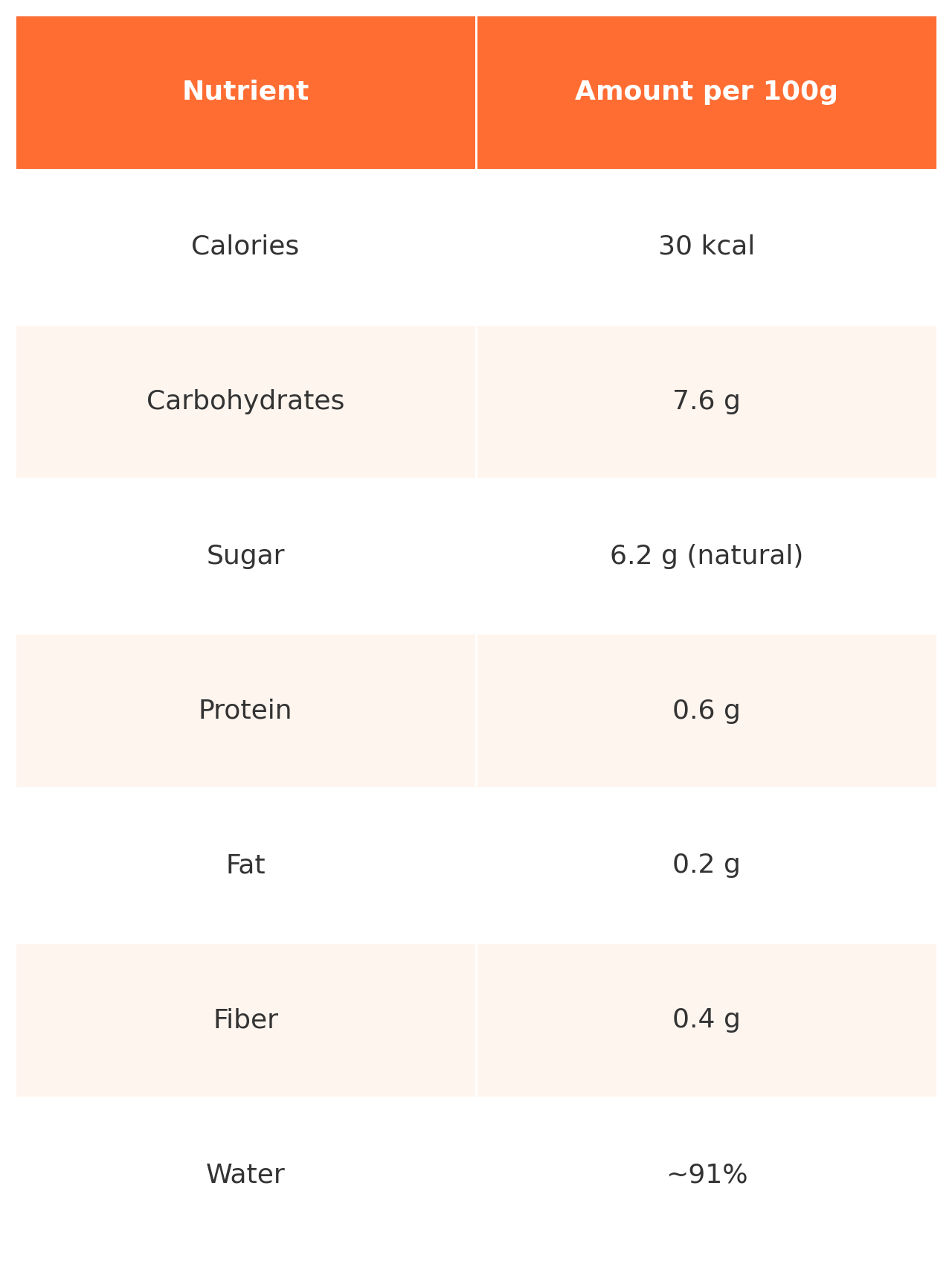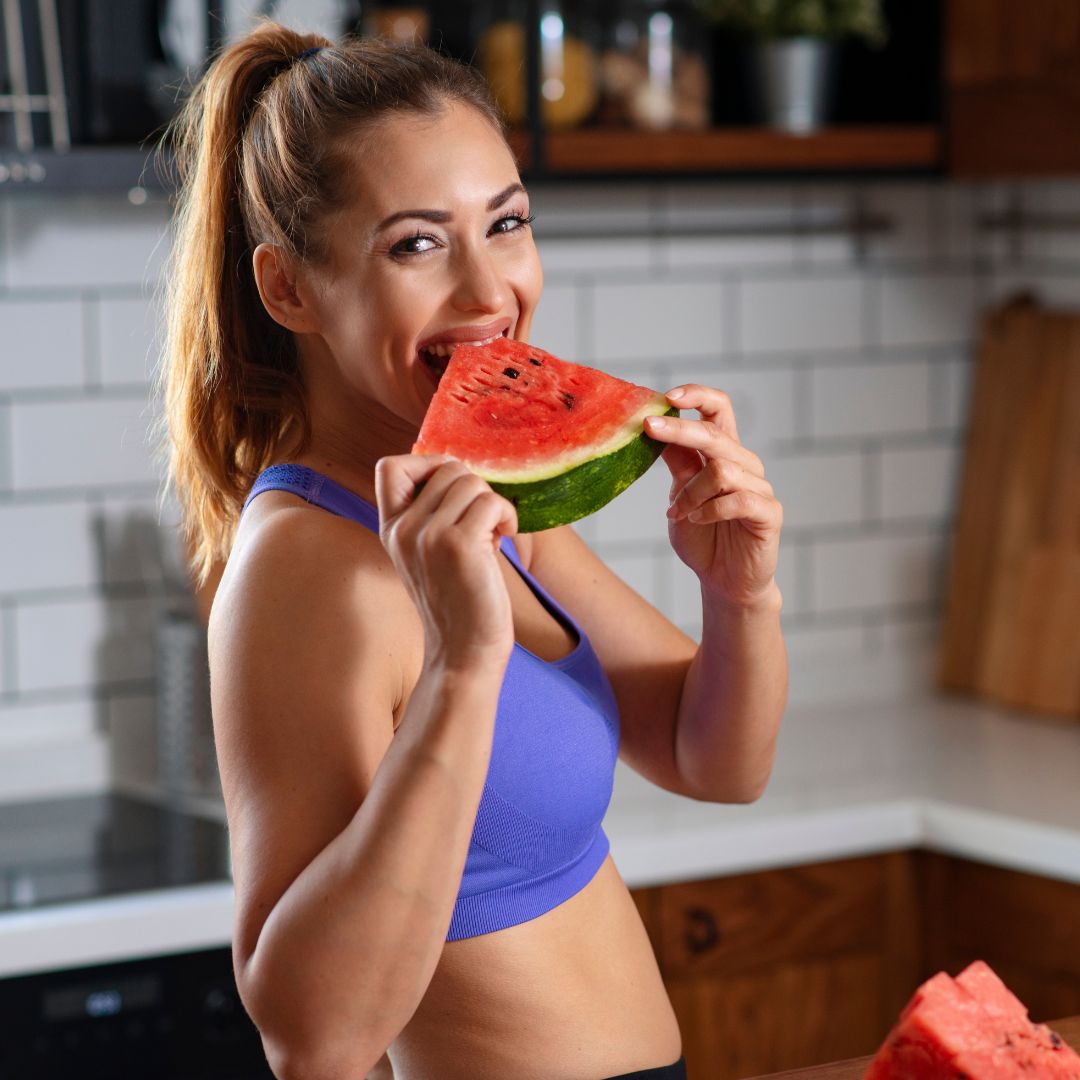Watermelon & Health Goals
Watermelon is naturally sweet, refreshing and loved by many. It is a perfect summer fruit and a sweet treat. But if you're an individual who wants to be healthy, trying to lose weight, build muscle or simply trying to track your intake, you must've found yourself wondering:
“How many calories does the watermelon contain? And is it any healthier to have it?”
If you've ever devoured half a watermelon (we all have been there) and found yourself guilty for doing so.
Too much sugar? Too many calories? Will it derail your progress?
Let's get you all straightened out—calories, macros, hydration, versatility in fitness, some myths and everything in between! Whether you're fresh to fitness or have been measuring your meals since yesterday, this will spell out how watermelon fits into your diet.
Are you new to fitness or nutrition? Sign up for a free 1-on-1 introductory appointment with a certified Papayya coach. No equipment required. Sign up today.
%20(1).png)
Quick Answer: Calories in Half a Whole Watermelon
Half a whole watermelon is approximately 450–650 calories.
But, let's break down exactly what goes into that estimate.
The Math:
- Whole watermelon weight: ~9–13 lbs (4–6 kg)
- Half watermelon weight: ~4.5–6.5 lbs (2–3 kg)
- Calories per 100g of watermelon: ~30 calories
(Source: USDA FoodData Central)
Let's do the math:
- 2 kg = 2000g → 2000g × 30 cal/100g = 600 calories
- 3 kg = 3000g → 3000g × 30 cal/100g = 900 calories
However, quite a bit also depends upon variety (seeded vs seedless), ripeness, and moisture content. Usually, half a watermelon, which weighs around 1.5-2.2 kg would contain around 450-650 calories.
Want to know how you can add watermelon to your diet?
A certified Papayya coach will help you tailor your nutrition without sacrificing your go-to foods. Start here.
%20(1).png)
Deep Dive: Watermelon Nutrition Breakdown
Let's get more closely acquainted with watermelon than calories. Here's what 100g (a standard handful of diced watermelon) provides:

✅ What Does This Mean?
- Natural sugar: Watermelon contains natural fruit sugars which is way better than added sugars.
- Hydration: With more than 90% water content, it assists in hydration.
- Low fat/ protein: Watermelon shouldn't be considered as a complete meal. It's best utilized as a supplement to your overall nutrition.
Glycemic Index vs. Glycemic Load
You must've heard that watermelon has a high quantity of glycemic index (GI), which can deter people who monitor their blood sugar levels on a daily basis. However, GI on tell part of the story
Watermelon's GI is ~72, but its glycemic load (accounting for portion size) is actually very low—something around 5 per 100g. That's what you should be more concerned with.
So as long as you're not having them in large quantities on an empty stomach, watermelon will not shoot you sugar levels on a massive scale.
Fitness is all about long term games. Want guidance beyond macros? Chat with a Papayya coach today for step-by-step support. Start your free trial.
%20(1).png)
Fitness Relevance: Is Watermelon Good for Weight Loss or Muscle Gain?
Relationship between Watermelon and Weight loss
Low energy density: Watermelon can fill your stomach without adding much calories, which is ideal for people in a calorie deficit.
Hydration = lesser water retention.
Watermelon can help offset the Dehydration caused by water retention which is commonly mistaken as “bloating”
Watermelon and Building Muscle
Antioxidants such as Lycopene: Reduce inflammation following strenuous exercise.
Let's bust the myth : “Eating fruits makes you fat.”
Say it loud: Fruit won't make you fat. Eating too much of anything will. Weight gain is motivated by a steady calorie surplus—not by foods.
So yes, even a half watermelon, though it's more calories than a small piece, is nothing to worry about—especially if it meets your day's calorie requirements.
➡️ Still stuck on fruit balancing and fat loss? Let a Papayya coach help you with science-driven tips. Try for free.
%20(1).png)
How to Add Watermelon to Your Workout Program
Watermelon is more than a snack—think outside the box incorporating it into your meals. Here are some ideas recommended by Papayya trainers:
- Post-Workout Shake:
Blend watermelon with protein powder, mint and lime juice for a cool-down recovery shake.
- Watermelon-Infused Water:
Cube watermelon and combine with cold water and basil/mint. Great tasting to drink throughout your day.
- Watermelon Feta Salad:
Combine chunks of watermelon, feta cheese, cucumber and arugula into a bowl. TOP with lemon juice and black pepper for a quick dosed meal.
When to eat it?
- Pre-Workout: small serving provides instant energy
- Post-Workout: replaces carbs and rehydrates
- Snack: perfect between the afternoons or evenings when cravings for sugar kick in.
Unsure on how/when to space your meals for your goals? Receive professional guidance from actual coaches who will fit their coaching around your life, goals, and schedule. Schedule your complimentary intro session today.
%20(1).png)
What are the potential Drawbacks and what you need to consider
Watermelon is often seen as a nutrition powerhouse, but it is very important to note that as with all good things, it's good to enjoy it in moderation and with sensitivity.
Here are a few things to watch out for
1. Mindless Overeating
Yes, it's low in calories per gram, but eating half a watermelon in a single sitting still translates to 450–650 calories. That is a meal. For someone on a weight-loss regimen whose target is 1500 calories, that's nearly half the calories for the day.
This isn't to say you can't eat it—it's just about being mindful. Cut a serving. Store the rest away. Don't graze from the bowl while watching a marathon.
2. Pre-Workout Discomfort
Because watermelon is full of water and fiber, consuming large amounts pre-workout might cause bloating or discomfort. Have it as a small serving if you have a workout coming right up afterward.
Having trouble adding fruit to a nutrition plan without losing results? Papayya's coaches combine real-world flexibility with expert guidance. Start for free.
%20(1).png)
Watermelon vs. Other Fruits: Final Comparison
Wondering how watermelon compares? Here's a quick glance at the calories and sugars found in 100g of popular fruits:

Insight: Attempting to eat more while remaining in a deficit? Watermelon is a great tool if you know how to utilize it. Our coaches at Papayya can teach you that. Test it now.
%20(1).png)
FAQs Regarding Watermelon & Calories
In order to address your lingering questions, we have the most popular ones that we get from our clients here:
❓Is it alright to consume half a watermelon during one sitting?
✔️ Yes, but pay attention to context. If it's within your daily calorie target and doesn't discomfort you, it's okay. Just space out your meals during the day.
Need tips on portion control and meal frequency? Talk to a coach today.
❓Is watermelon too sugary for weight loss?
❌ No. Watermelon does contain natural sugar, but its glycemic load is low. It's not likely to lead to fat gain unless eaten excessively on a regular basis.
Sugar myth-confused? Papayya trainers break down science-supported nutrition.
❓How much does watermelon weigh against a protein bar nutritionally?
Most protein bars range from 180–250 calories. Half a watermelon might have 2–3 times as much, with more water and less fat or protein.
Tip: Watermelon is an excellent recovery food or snack, but it's not a protein source.
%20(1).png)
What's better post-workout: watermelon or a sports drink?
Watermelon has natural sugar, potassium, water, and trace amounts of citrulline—all beneficial post-workout. It's also not one of the sports drinks that include added sugars or dyes.
Bonus tip: Experiment with mixing watermelon and a pinch of salt for a do-it-yourself electrolyte drink.
Looking for easy swaps like this for your recovery protocol? Schedule a free consult today.
What It Means for Your Wellness Journey
A half of a whole watermelon is around 450-650 calories. It's easy to overeat watermelon because of how sweet it is, and how much volume it has, but watermelon is energy-empty, bulky and water-filling if we work it to our advantage.
Translate it for the fitness newbie or someone who has gone through calorie counting, weight loss, or intuitive eating, watermelon can be a friend - not a foe.
And here's the important truth:
No food derails your progress. It's the habit that counts.
So indulge in the slice (or half!) of watermelon guilt-free. But do it with awareness. With self-assurance. With intention.
Need help along the wellness path? With Papayya, enjoy flexible, human-driven fitness guidance from actual pros—right at home.
No equipment. No guilt. No judgment. Just guidance.
Begin your free trial today: www.papayya.com
%20(1).png)
References:
1. USDA FoodData Central – Nutritional values of raw watermelon
https://fdc.nal.usda.gov/food-details/167765/nutrients
2. Harvard T.H. Chan School of Public Health – Glycemic index and load explained
https://www.hsph.harvard.edu/nutritionsource/carbohydrates/carbohydrates-and-blood-sugar/
3. NIH (PubMed) – Effects of L-citrulline in watermelon on exercise performance
https://www.ncbi.nlm.nih.gov/pmc/articles/PMC6520873/
4. MyFitnessPal – Calorie count for watermelon
https://www.myfitnesspal.com/food/calories/watermelon-100g-29097777
.svg)

.webp)
 FACEBOOK
FACEBOOK
